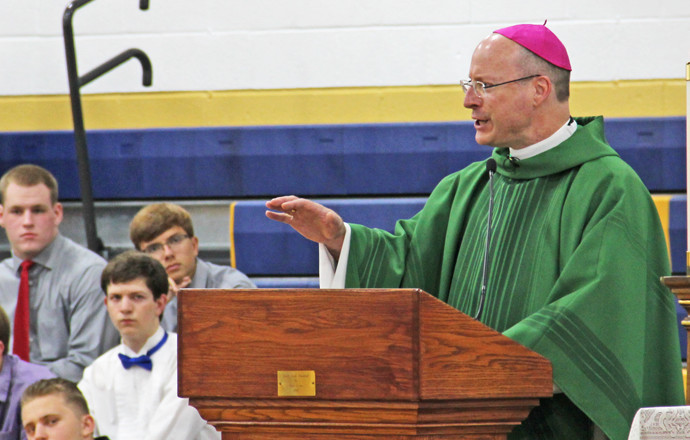Bp. McKnight highlights spiritual dimension of society
Calls for ‘preferential option for the abused’
Bishop W. Shawn McKnight held nothing back in his homily for the closing Mass at the Missouri Catholic Conference 2018 Annual Assembly.
“The little ones among us are deserving of the Church’s preferential protections and must not be ignored,” he asserted. “Anyone lacking Jesus’ concern for children, youth, or anyone placed in our hands for safekeeping and nurturing, does not belong in the Priesthood, the episcopacy, or any position of power and authority within the Church.”
He emphasized “how unchristian, unholy, and shameful clergy sexual abuse is; and how the abuse of power by the hierarchy is detrimental to the Church’s mission.”
All beautiful words and actions will fall on deaf ears and closed eyes if they are not accompanied by “a preferential option for the abused,” he said.
“Without a sufficient and visible repugnance for the scandal plaguing our Church, backed up with decisive actions, we cannot credibly witness the faith of Jesus Christ in our world,” he stated.
“Church at the Peripheries”
The Missouri Catholic Conference (MCC), public-policy agency of the state’s four Roman Catholic dioceses, sponsors the Annual Assembly each year.
It is an opportunity for Catholics from throughout the state to learn and pray together about pressing public-policy issues of the day, ranging from abortion and healthcare to immigration and the death penalty.
This year’s theme was: “Five Years of Pope Francis: The Church at the Peripheries.”
Each of the speakers at the event, held Oct. 6 at Helias Catholic High School in Jefferson City, examined some aspect of the Pope’s vision of a Church mobilized to treat the wounded on the battlefields of greed, alienation and indifference.
“All of us are made in the image and likeness of God, are children of God,” Bishop McKnight preached in his homily. “He guarantees our dignity and worth. He preserves our life, even dying for us.”
Joining him at the altar were Archbishop Robert J. Carlson and Auxiliary Bishop Mark S. Rivituso of St. Louis, Bishop James V. Johnston of Kansas City-St. Joseph, Bishop Edward M. Rice of Springfield-Cape Girardeau, and Bishop Emeritus John R. Gaydos of Jefferson City.
Members of the MCC Public Policy Committee proclaimed the readings.
The Helias Catholic High School Concert Choir led the singing.
Spiritual dimension
Bishop McKnight said the Annual Assembly and the MCC’s work throughout the year remind Catholics of the spiritual dimension of their engagement with worldly affairs.
“Law and policies are important, but law is not everything,” he said. “There is something more to life than our material, legal existence; and this something more is what we call living in the kingdom of God.”
That kingdom is the world as God originally intended it.
“We suffer when we fail to consider the spiritual dimension of who we are as human beings, made in the image and likeness of God,” he said.
Without grace and Christ’s teaching, people easily fall prey to worldly delusions, carrying on a human existence that is without any lasting meaning and purpose.
“Jesus, from His perspective as God, is able to spot dangers that we miss — dangers that we often ignore only to suffer their consequences later on,” said Bishop McKnight.
Eternal foundations
Two of the readings for the Mass (Genesis 2:18-24 and Mark 10:2-16) focused on marriage — a sacred covenant involving a husband, a wife and God.
“The institution of marriage is not a creation of law but has its origin in God,” said Bishop McKnight.
In the Gospel reading, Jesus also invited the children to Himself, stating that no one can enter the Kingdom of God unless they become like children.
“Jesus recognized the dignity of the children, having even a preferential option for them, by embracing and blessing them,” Bishop McKnight noted. “Unless one is childlike, He taught, you cannot enter the kingdom of God.”
In imitation of Christ, Christians are always obliged to give special attention and preference to children and all of the rest of society’s most vulnerable people.
“Faithful disciples of Jesus avoid the mindset of keeping the undesirables far from the Lord or from his Church,” said Bishop McKnight.
“Whenever someone’s humanity is not recognized, they are to be given preference and special concern within Jesus’ own Church: from the unborn to the elderly, the refugee or immigrant, those who suffer racism and discrimination, the sick and the suffering, the working poor and the addicted.”
Jesus came to save not only the people recognized under human law as having rights, but for all people.
The profound respect He modeled for the dignity of all human life is the foundation for the Church’s social justice teaching “as expressed in her pro-life, pro-immigrant, pro-worker, pro-everyone stance,” said Bishop McKnight.
But he cautioned against society’s tendency to view the dignity and rights of individuals as something separate from God’s eternal law.
“Our very life is a gift, and the moment in history in which we live is providentially determined, not by us, but by God,” said Bishop McKnight.
Therefore, observing secular law alone is not enough.
“We must reach beyond mere law to the eternal, God-given foundations of our own identity and dignity,” he said.
With God’s grace, the Church must be a sign of hope in times of tragedy and crisis, and a reminder of spiritual dimensions of individuals and society.
“The Church does not have to have a perfect world in order to function well,” he stated. “In fact, it seems as though whenever the world becomes difficult for the Church, it is then that the beauty of the Gospel of Jesus Christ shines the most brilliant.”







